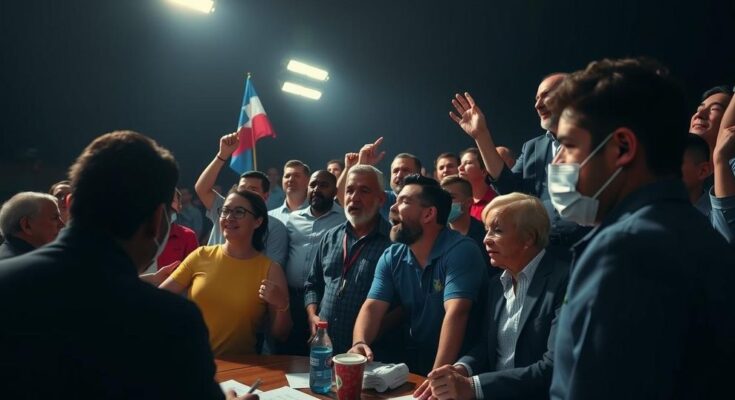Uruguay’s upcoming presidential runoff features two centrist candidates, Orsi and Delgado, with a close race anticipated due to 25,000 votes separating them. Voter turnout from supporters of fringe candidates from the first round will potentially play a decisive role. Overall socio-economic conditions and moderate political platforms create a unique electoral landscape this November.
Uruguay’s presidential election runoff is set for November 24, with two centrist candidates, opposition candidate Yamandu Orsi and ruling coalition candidate Alvaro Delgado, vying for the presidency. The outcome may hinge on the approximately 8% of voters who supported fringe candidates in the initial round, particularly those who backed anti-establishment candidate Gustavo Salle, known for his radical stances against vaccines and corruption. Recent polls indicate a tight race, with only 25,000 votes separating the two leading contenders.
While President Luis Lacalle Pou cannot seek re-election due to constitutional restrictions, both Orsi and Delgado are trying to attract votes from those who supported smaller parties or did not participate in the first election. The two leading candidates have thus far failed to put forth distinct pledges aimed at these specific voter groups. Given that Uruguay does not exhibit stark right-left political divisions as seen in many global democracies, the rising concerns over living costs, inequality, and crime could significantly influence voter behavior.
Salle’s less conventional campaign attracted a notable share of the votes, as he encouraged his supporters to reject traditional political figures. The current political environment reflects a general consensus on economic policies between the two main candidates, complicating efforts to capture the electorate’s attention. As reported, analysts predict that a low turnout may favor the center-right coalition, necessitating Orsi’s Broad Front to galvanize support to achieve a victory.
The context of this article centers around the forthcoming presidential election in Uruguay, emphasizing the potential impact of fringe votes on the outcome. The South American nation is experiencing a stable political climate, with recent improvements noted in inflation and employment, yet persistent challenges such as inequality and crime remain. The article draws attention to critical factors that could sway undecided voters, specifically the strategic influence of smaller party candidates like Gustavo Salle who resonated with a subset of the electorate. Understanding the dynamics at play, including voter apathy and the tendency toward moderate candidates in Uruguay, is crucial for grasping the stakes involved in this election.
As Uruguay approaches its presidential runoff, the race remains closely contested between centrist candidates Orsi and Delgado. With a narrow margin of merely 25,000 votes in the spotlight, the preferences of voters who supported fringe candidates are poised to play a crucial role in determining the outcome. The lack of significant changes proposed by either candidate highlights a political atmosphere characterized by moderation and continuity, yet underlying socio-economic concerns could drive voter turnout and preferences, shaping the narrative of this election.
Original Source: www.usnews.com




